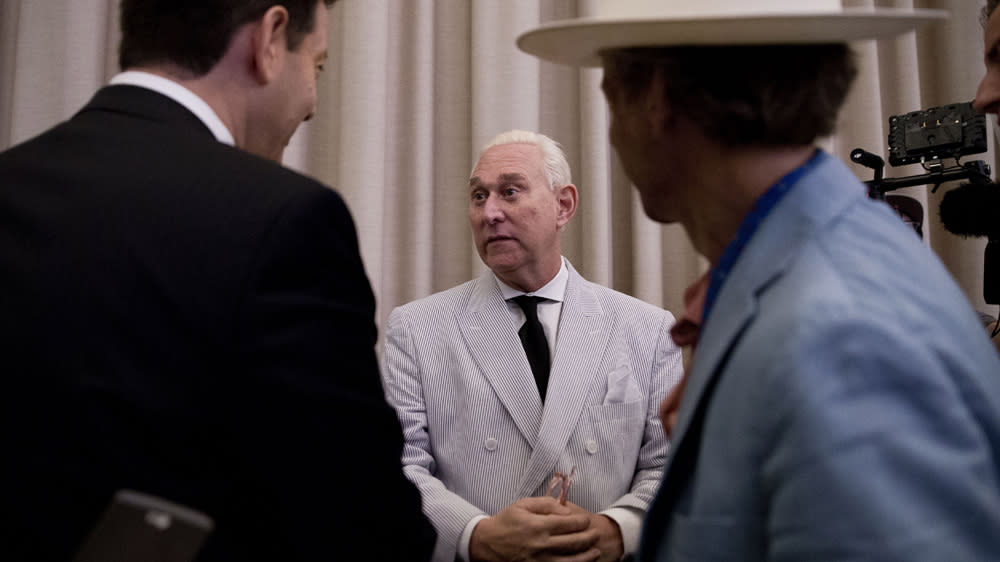PopPolitics: Roger Stone on What Trump Should Do to Get Beyond the Russia Story (Listen)

Roger Stone, the political operative who was an informal associate to Donald Trump’s presidential campaign, denies that he has anything to do with Russian meddling in the election and predicts that the investigations will lead nowhere.
But in an interview with Variety‘s “PopPolitics” on SiriusXM, Stone also says that he would like to see the White House be “a little bit more aggressive” in making its claim that there is nothing to allegations of coordination with Russian sources.
“The president could order the government agencies to release all records and files pertaining to Russian collusion,” Stone says, adding that he could also order the National Security Agency to release any records of Trump’s phone conversations being monitored.
“He has power to prove that this entire charge is a canard.”
Listen below:
At last week’s House Intelligence Committee hearing, Rep. Adam Schiff (D-Calif.), the ranking member of the committee, went through a timeline of what he called the circumstantial case for links between Russian intelligence and the Trump campaign. Included in his summary were tweets and statements made by Stone that suggested that he had advanced knowledge in August that WikiLeaks would release a trove of emails related to Clinton’s campaign.
But Stone says that Schiff has misled the committee in characterizing his exchange with hacker Guccifer 2.0.
“He has reversed the order to create the impression of collusion,” says Stone, who has offered to testify before the House and Senate intelligence committees, but has yet to hear back from them.
Listen below:
Stone authored the book “The Making of the President 2016,” an account of the recent campaign with his own analysis and his history with Trump, stretching back to the late 1970s. He also is the subject of a Netflix documentary, debuting May 12.
On Aug. 21, Stone tweeted, “It will soon be Podesta’s time in the barrel.” Podesta’s email account was hacked and the emails were released in October, leading to the claim that Stone had advanced knowledge, but he says that the tweet indicates no such thing.
Trust me, it will soon the Podesta's time in the barrel. #CrookedHillary
— Roger Stone (@RogerJStoneJr) August 21, 2016
He does say that he did speak to an intermediary, who had contact with WikiLeaks founder Julian Assange, and tipped Stone that the site had damaging information about Hillary Clinton.
“Podesta’s ‘time in the barrel’ means a time of public scrutiny, as Paul Manafort was going through,” Stone says. “That particular tweet does not say, hashtag WikiLeaks. Hashtag Julian Assange. So to say that refers to a subsequent release of Podesta’s emails by WikiLeaks is conjecture. It’s speculation.”
Listen below:
Stone also talks about why he believes he has been under surveillance for some time by the government, and whether his reputation as a notorious political operative may have backfired on him.
When Hollywood Went to War
Netflix recently debuted “Five Came Back,” a documentary series about five top Hollywood directors who put their careers aside to join the Allied fight in World War II. John Huston, John Ford, William Wyler, Frank Capra, and George Stevens each joined the service for different reasons, but what they did was create a new kind of propaganda film to counter the Axis message.
Mark Harris, the author of the book on which “Five Came Back” was based, talks about why the military turned to Hollywood to make movies like “Why We Fight” and “The Battle of Midway.”
Listen below:
Harris doubts that there will ever again come a point when Hollywood will engage in the kind of cooperation with the U.S. government that was seen during World War II.
Listen below:
“PopPolitics,” hosted by Ted Johnson, airs from 2-3 p.m. ET/11-noon PT on SiriusXM’s political channel POTUS. It also is available on demand.
Get more from Variety and Variety411: Follow us on Twitter, Facebook, Newsletter
